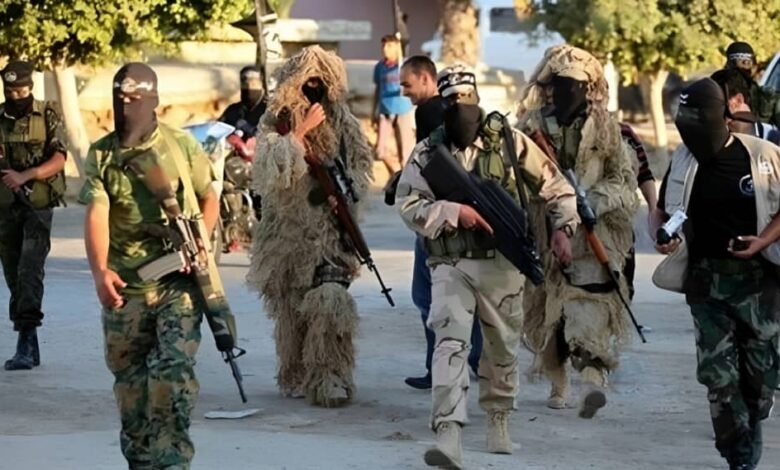What Happens if The Regime in Iran Stops Running Global Terrorism

iran paramilitary militias terrorism
Written by
Shahriar Kia
On Sunday, December 3, during a session titled “The Second National Conference on the Implementation of the Constitution,” the Iranian regime’s president Ebrahim Raisi asserted, “Our backing for Gaza and Palestine aligns completely with constitutional principles, deeming support for the oppressed as a crucial duty of the Islamic government. Consequently, since the triumph of the Islamic Revolution, a fundamental tenet of the foreign policy of the Islamic Republic of Iran has been to support the rights of the Palestinian people, recognizing this as a paramount issue in the Islamic world. Despite global political changes and regional inclinations, this foundational principle in our foreign policy remains unwavering.”
For a regime that justifies the suppression of women through the pretext of “piteous attire” and enforces internet censorship under the guise of “user protection,” such statements might seem like mere political rhetoric. However, there is a degree of truth in Raisi’s words, a figure known for his systematic deceit and duplicity.
The theocratic rule in Iran inherently involves supporting terrorism and extremist groups. As Ruhollah Khomeini, the previous Supreme Leader and the founder of this regime, famously stated, “Preserving the system is of highest priority,” his successor, Ali Khamenei, has emphasized this in recent years, stating, “If we don’t combat terrorists in Syria or Iraq, we must confront them in the streets of Hamedan and Kermanshah.”
Throughout the course of the Iranian regime’s history, regardless of economic conditions, political instability, or periods of war, there has never been a moment when the regime abstained from intervening in the affairs of other countries, driven either by diplomatic considerations or foreign policy priorities. Even during the 24 years when three administrations professed to pursue de-escalation and cultivate positive relations with the West –during the presidencies of Ali Akbar Hashemi Rafsanjani, Mohammad Khatami, and Hassan Rouhani – the Iranian regime consistently sustained its engagement in the Middle East, North Africa, and Latin America. This reality finds strong support in extensive research conducted by Western intelligence services and think tanks.
An overview of #Iran’s history of hostage-taking and how Western appeasement has fueled Tehran’s #terrorismhttps://t.co/ieaaOkZb6y
— NCRI-FAC (@iran_policy) October 19, 2023
In the past four decades, the Iranian regime has maintained a consistent approach, while the West has varied its strategy by seeking “moderates” or “rational elements” in Tehran.
Certain individuals in the West might erroneously believe that the Iranian regime, though labeled as the leading state sponsor of terrorism, hasn’t been offered sufficient incentives or pressure to prompt a reassessment of its foreign policies. Regrettably, these individuals seem to lack a thorough understanding of the Iranian regime, and their years of study may have been unduly influenced or tainted by inaccurate sources.
In contrast to traditional tyrannical regimes, the adventurous agendas of the Iranian regime do not stem from inherent strength. This regime lacks critical foundations of genuine power, e.g. a robust economic infrastructure, widespread social support, and a truly loyal and ideological force. After the conclusion of the Iran-Iraq War, during which both the regime and the global community gained a true understanding of Iran’s actual military capabilities, the regime has abstained from military adventurism. This restraint is not indicative of Tehran’s peaceful intentions but rather a recognition of the deteriorating morale within its corrupt forces, entangled in capitalism and managing an inefficient military system.
Therefore, destabilization beyond Iran’s borders is not a power leverage but, as explicitly stated by Khamenei, a defensive strategy for survival. Throughout more than two decades of nuclear negotiations, the regime has not been willing to discuss its ambitious regional plans, and Western negotiating parties have failed to grasp the reasons behind the regime’s unwavering stance.
The lack of understanding of the Iranian regime’s behavior has incurred substantial costs, both in terms of lives and finances, for the region and the world. The regime neither wants nor can abandon its extremist policies, and no amount of incentives or pressure will persuade it to do so.
According to Mrs. Maryam Rajavi, the President-elect of the National Council of Resistance of Iran, the regime stands on two pillars: internal suppression and external terrorism. The elimination of either of these pillars will precipitate its downfall.
Suppression at home and export of terrorism and war abroad are the two pillars for the clerical regime’s survival – Message to the conference at the UK House of Commons, “Iranian regime’s terrorism poses threat to global security” #Iran pic.twitter.com/FTpnst6YQ0
— Maryam Rajavi (@Maryam_Rajavi) October 15, 2020

